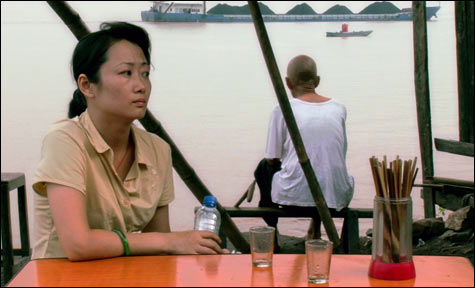
ALIENATION AND ERODED AERCHITECTURE: Jia has listed Bresson, Fellini, and Hou Hsiao-Hsien among his influences. |
Have you concluded that Zhang Yimou is a softy and a sellout? That the esteemed Chinese director of Raise the Red Lantern and other classics of social consciousness has squandered his soul with such kung-fu programmers as Hero and House of Flying Daggers? Back home, Zhang and his so-called “Fifth Generation” school of directors have been attacked as mainstream and escapist by younger “Sixth Generation” filmmakers, whose anti-nostalgic works are set on the grimy, mean-spirited streets of contemporary post-Communist China.
On the same day in 2006 that Zhang (born 1951) premiered in China his Curse of the Golden Flower, Jia Zhangke (born 1970), the most important “Sixth Generation” director, opened his Still Life, a blustery act of provocation. The films couldn’t be more different. Zhang’s lavish action-romance costumer is the most expensive Chinese picture ever. Still Life, which plays at the MFA March 6-16, is tough, lean, pessimistic, documentary-like. Its fictional focus is on everyday people in the harsh shadow of the infamous Three Gorges Dam Project, which has displaced a million people to allow the flooding and damming of the Yangtze River. Do the two films have anything in common? Chow Yun-Fat stars in Zhang’s film. In Jia’s film, Chow gangster dialogue (from a John Woo movie?) is quoted as cool philosophy by a government-employed thug: this Chow fan beats up Chinese citizens who refuse to abandon their homes.
Still Life won the Golden Lion at the 2006 Venice Film Festival, but it’s only now opening in America. Jia (Platform, The World) might be as great a filmmaker as Zhang, but he’s not an audience-friendly one, with his languid pans, his long, long takes, the distance between his camera and his characters (this movie has less than half-a-dozen close-ups), the uncomfortable pauses in the dialogue (as if the actors had forgotten their lines), and his anonymous-faced, purposefully anti-charismatic casts. Still Life marks his third use of the homely, bad-postured Han Sanming, here playing, in his usual passive, expressionless way, a coal miner (also called Sanming) with only the undershirt on his back. He’s come to Fengjie, upstream of the Three Gorges Dam, in search of the wife who ran away 16 years earlier, and their daughter. Does he deserve to find Missy Ma (Ma Lizheng)? In time, we find out that he bought his bride, in a kind of slavery exchange that seems common among the low-life populace of this movie.
Halfway through, Jia takes up a second, parallel tale. Shen Hong (Tao Zhao), a brooding nurse, arrives also in Fengjie, in search of the husband (Li Zhubing) who left her two years earlier. Widening his social spectrum, Jia dramatizes here a middle-class Chinese story. The missing spouse is a kind of capitalist bureaucrat who drives a fancy car. When he and his wife feud among piles of rocks, the alienation amid eroded architecture reads like a ’60s Antonioni movie. (Jia has listed Bresson, Fellini, and Hou Hsiao-Hsien among his influences.)
Jia brought his camera crew to Fengjie in 2005, the fatal months during which it was razed, flooded, and drowned. Fact and fiction merge: Jia’s protagonist, Sanming, joins in the film with the actual demolition workers in bringing the city down. “Such a quick destruction of a 2000-year-old town is simply unimaginable,” Zia said an in interview. “It’s as if there had been an alien invasion.” Amid the super-realism of Still Life, watch for Jia’s eye-blink moments of sci-fi surrealism: a building bolting into space, a UFO sailing across the ghostly deserted metropolis.